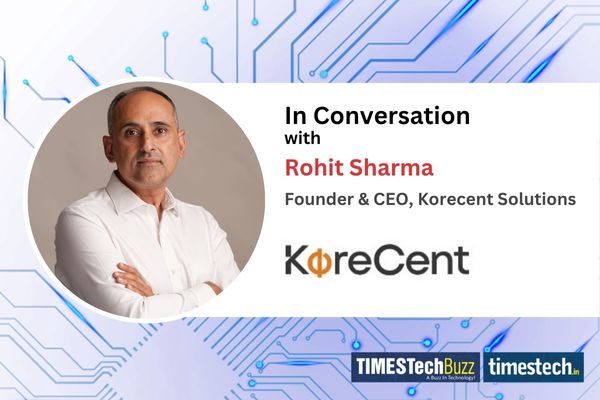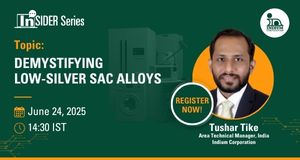In an interview with TimesTech, Rohit Sharma, Founder & CEO of Korecent Solutions and an international cycling champion, shares how his sporting grit translates into tech leadership. He discusses Korecent’s role in smart manufacturing, leveraging AI and IoT for Industry 4.0, and enabling global digital transformation. Rohit also outlines his vision for empowering Indian SMEs through scalable, intelligent, and accessible tech solutions in the decade ahead.
Read the full interview here:
TimesTech: From International Cycling Champion to Tech Entrepreneur, what inspired your transition from the race track to the boardroom, and how do these seemingly different worlds complement each other?
Rohit: My path from cycling to entrepreneurship was not a transition, but an evolution. In cycling, I learned to challenge myself, endure discomfort, set goals, and keep going until I figured it out—these principles are right in line with tech/startup organizations. As Max Levchin, the founder of PayPal, has said cycling is about riding through discomfort, and deciding to grind, rather than quit on an idea. Whether it is officiating race events or running Korecent, the same perseverance, focus, and fast decision making bind the two worlds and strengthen my motivation to keep pushing forward.
TimesTech: As the Founder & CEO of Korecent Solutions, you’ve been driving smart manufacturing and ERP innovation. What gaps in the traditional enterprise systems were you aiming to solve when you started Korecent?
Rohit: Back in 2014, when I started Korecent, ERP systems still felt inflexible, expensive, and excruciatingly slow to change, often limited real-time visibility, intelligent analytics, and automation capabilities in a dynamic environment. We wanted to fill this void by providing smart manufacturing and ERP innovation focused on:
- Live BI dashboards and predictive analytics with ERPNext
- Hyper-automation (AI, RPA, IoT) to automate repetitive tasks and manufacturing workflows.
- Highly configurable, low-code frameworks for implementing unique processes – not “one-size-fits-all” ERP
In essence, we aimed to offer agile, intelligent, and user-friendly enterprise systems built for modern businesses.
TimesTech: Industry 4.0 is rapidly evolving. How is Korecent leveraging IoT and AI to enable digital transformation, especially for traditional sectors like manufacturing?
Rohit: At Korecent, we are reinventing Industry 4.0 with in-situ IoT sensors in shop floors, harvesting real-time data for equipment health, inventory, environmental conditions and more. This is all fed into our AI-backed platforms for predictive maintenance (reducing unexpected downtime), quality control with vision AI, and smart inventory tracking in warehouses
By combining edge-to-cloud connectivity and machine learning, we enable manufacturers to predict failures, automate interventions, optimize supply chains, and increase energy efficiency to transform rigid legacy systems into adaptable, intelligent and digitally-ready operations.
TimesTech: You’ve collaborated with global names like Hero Honda, Siemens, and Ethiopian Airlines. Could you share a success story or challenge that stands out in your international consulting experience?
Rohit: “One project that truly stands out in my international journey…”
…was when we were brought in by a US-based Fortune 5000 client struggling with a multi-million-dollar ERP transformation project. The system spanned operations across enterprise, and despite investing heavily, they were missing go-live deadlines and bleeding efficiency daily.
Their internal teams were fragmented, global vendors were locked in blame loops, and leadership was losing confidence fast.
We were invited as a last resort — not to patch the system, but to realign the vision and execution. I led a compact but high-caliber cross-border task force from our side.
Instead of pitching another technical fix, we proposed a “business-first transformation approach.” We co-created a phased roadmap with local teams from Germany, India, and the US — redefining processes, aligning the system to actual business needs, and most importantly, restoring trust across teams.
Three months later, they didn’t just go live — they did it under budget, ahead of time, and with full adoption.
TimesTech: Your journey includes both business leadership and sports governance. How has your experience as a UCI Commissaire and executive member of the Cycling Federation of India influenced your leadership style in tech?
Rohit: Serving as a UCI Commissaire and as an executive member of the Cycling Federation of India has greatly informed and developed my leadership experience in technology. In officiating, I discovered how to make very quick and unbiased decisions, often under considerable pressure. This has help me in my daily work steering Korecent through complex problems with clients. Furthermore, in sports governance, I saw the value of influencing multiple stakeholders and communicating clearly to get diverse groups of people on a common path. My experiences from officiating and as an executive have emphasized the significance of communicating clearly, objectively, and being adaptable. I would like to describe these principles as core principles I apply to each project and each partnership at Korecent.
TimesTech: With your extensive experience, what’s your vision for the next decade of digital transformation in India, particularly in SME adoption of smart technologies?
Rohit: In the decade to come, I anticipate Indian SMEs adopting a digital first approach and transitioning to an AI, IoT and cloud based ecosystem, which will lead to efficiency and innovation. Even though many SMEs have taken the first steps towards digitalization, significant impediments exist that are causing paralysis such as high implementation cost, skill gaps and resistance to change. To overcome the obstacles these enterprises face, companies with robust training programs and inexpensive scalable solutions are primary. At Korecent we wish to address these challenges by enabling smart technologies that are accessible, so that SMEs can increase productivity and competitiveness, benefitting from an evolving digital economy.

















